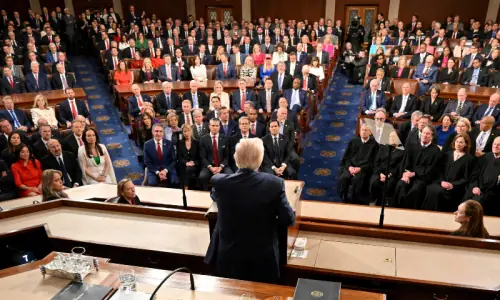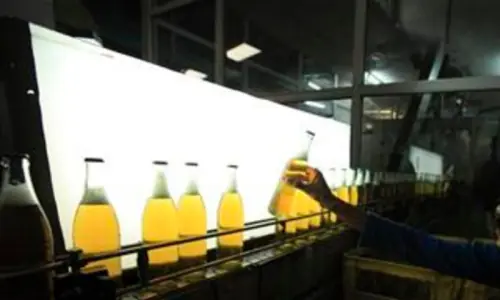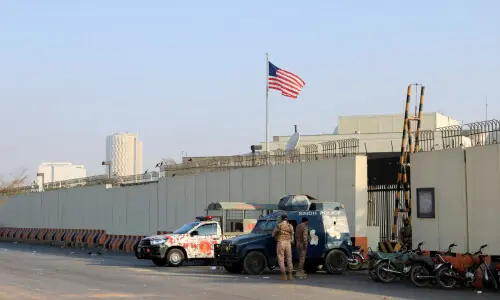The Election Commission of Pakistan (ECP) found that PTI Chairman Imran Khan “intentionally and deliberately” violated the Elections Act, 2017, according to the detailed Toshakhana reference verdict released on Monday.
The ECP had disqualified Imran in the reference on Friday under Article 63(1)(p) for making “false statements and incorrect declaration”. However, the full text of the 36-page order was not officially released, raising questions about whether it was really a unanimous decision and providing fodder to rumour mills to go into overdrive over the possibility of a dissenting note.
Imran filed a plea in the Islamabad High Court (IHC) on Saturday, challenging the ECP verdict.
The detailed verdict released today, a copy of which is available with Dawn.com, said: “The respondent has intentionally and deliberately violated the provisions contained [in] sections 137 (submission of statement of assets and liabilities), 167 (corrupt practice) and 173 (making or publishing a false statement or declaration) of the Elections Act, 2017, who has made a false statement and incorrect declaration before the commission in the statement of assets and liabilities filed by him for the year 2020-21,” elaborating that thus, Imran attracted disqualification under Article 63(1)(p).
Similarly, the ECP said he had “deliberately concealed the material facts” by not disclosing the details of his gifts in the statement of his assets and liabilities for the year 2018-19 or accounting for the sale proceeds.
The electoral watchdog explained that the PTI chief had not provided details of the gift items and had also failed to add the details of the cash and bank account of the sale proceeds in the relevant Form-B sections.
“The amount allegedly received in his bank account does not commensurate with the assessed value of the gift items. Hence, the respondent has filed false statement and incorrect declaration, in material particular, for the financial year 2018-19,” the verdict reads.
It explained that Imran had also not provided any explanation that any non-disclosure was “unintentional, accidental or [a] bona fide mistake”.
Regarding gifts purchased for the financial year 2019-20, the verdict reads that Imran made an “evasive and ambiguous” statement in his written reply that the gifts for that period were further gifted on to others. However, the verdict said that the relevant Form-B section was left empty for this and there was no explanation provided.
“Therefore, it is established that he has deliberately concealed material facts and has submitted [a] false declaration of his assets and liabilities, in particular material, which entails serious consequences under the Constitution and law,” the verdict states.
As a result, the ECP said it was of the “considered opinion” that Imran stood disqualified, ceased to be an MNA and had also committed an “offence of corrupt practices” under the relevant Elections Act sections for “false statements and incorrect declaration”.
Regarding its jurisdiction in the case, the ECP quoted relevant case law and verdicts to justify its role in the Toshakhana reference. It pointed out that the record of gift items received was maintained by the Toshakhana and the electoral watchdog was only limited to scrutinising the statement of assets and liabilities.
“It was the obligation of the respondent to declare complete details of assets whether in [the] shape of gifts or amount, including transfer of any assets to any person during the financial year, in the annual statement of assets and liabilities along with details and its cost value in column number 2 and 3 of Form-B (remarks).
“The commission has the jurisdiction to inquire into any matter or objection raised by any person, including a reference from [National Assembly] speaker against any member of the parliament or an assembly regarding concealment, false or misdeclaration in the statement of assets and liabilities after 120 days,” the verdict reads.
Quoting case law, the ECP contended that it had the “exclusive jurisdiction” to adjudicate on the issue of a lawmaker’s disqualification if received from the NA speaker or Senate chairman in terms of Article 63(2) and to decide the referred question under Article 63(3) of the Constitution, adding that it was also therefore, “competent” to judge in the Toshakhan instant matter.
The reference
The reference was filed in August against Imran by the coalition government, for “not sharing details” of Toshakhana gifts and proceeds from their alleged sale. Lawmakers from the Pakistan Democratic Movement — the ruling alliance — had submitted the reference to NA Speaker Raja Pervaiz Ashraf, who had subsequently forwarded it to Chief Election Commissioner (CEC) Sikander Sultan Raja for further action.
Established in 1974, the Toshakhana is a department under the administrative control of the Cabinet Division and stores precious gifts given to rulers, parliamentarians, bureaucrats, and officials by heads of other governments and states and foreign dignitaries.
According to Toshakhana rules, gifts/presents and other such materials received by persons to whom these rules apply shall be reported to the Cabinet Division.
However, the PTI, while in government, had been reluctant to disclose details of the gifts presented to Imran since he assumed office in 2018, maintaining that doing so would jeopardise international ties, even as the Pakistan Information Commission (PIC) ordered it to do so.
But later, in a written reply submitted to the ECP on September 8, Imran had admitted to selling at least four presents he had received during his tenure as the prime minister.
The former premier, in his reply, had maintained that the sale of the gifts that he had procured from the state treasury after paying Rs21.56 million fetched about Rs58m. One of the gifts included a graff wristwatch, a pair of cuff links, an expensive pen and a ring while the other three gifts included four Rolex watches.
The reference against Imran was filed by MNA Barrister Mohsin Nawaz Ranjha carrying signatures of lawmakers Agha Hassan Baloch, Salahudeen Ayubi, Ali Gohar Khan, Syed Rafiullah Agha and Saad Waseem Sheikh and it was subsequently forwarded to CEC Raja.
In their disqualification reference, MNAs from the ruling alliance included documentary evidence to corroborate their claims against the ex-premier and sought his disqualification under Sections 2 and 3 of Article 63 of the Constitution, read with Article 62(1)(f).
Article 62(1)(f) says: “A person shall not be qualified to be elected or chosen as a member of Majlis-e-Shoora (Parliament) unless […] he is sagacious, righteous and non-profligate, honest and ameen, there being no declaration to the contrary by a court of law.”
Article 63(2) says: “If any question arises whether a member of Majlis-e-Shoora (Parliament) has become disqualified from being a member, the Speaker or, as the case may be, the Chairman shall, unless he decides that no such question has arisen, refer the question to the Election Commission within thirty days and should he fail to do so within the aforesaid period it shall be deemed to have been referred to the Election Commission.”
While, Article 63(3) reads: “The Election Commission shall decide the question within ninety days from its receipt or deemed to have been received and if it is of the opinion that the member has become disqualified, he shall cease to be a member and his seat shall become vacant.”
The Toshakhana case
Last year, the PIC had accepted an application by Islamabad-based journalist Rana Abrar Khalid and directed the Cabinet Division to “provide the requested information about the gifts received by [then] prime minister Imran from foreign head of states, head of governments and other foreign dignitaries … description/specification of each gift, information about the gifts retained by the PM and the Rules under which gifts thus received are retained by him”.
The Cabinet Division was told to share the required information within 10 working days and upload it on the official website as well.
Subsequently, the Cabinet Division had challenged the PIC order in the IHC, claiming that it was “illegal, without lawful authority”. The then-government took the stance that the disclosure of any information related to Toshakhana jeopardises international ties.
In April this year, the IHC had directed Deputy Attorney General Arshad Kayani to ensure the implementation of the PIC order to publicise details of the gifts presented to former prime minister Imran by heads of states since he assumed office in August 2018.































